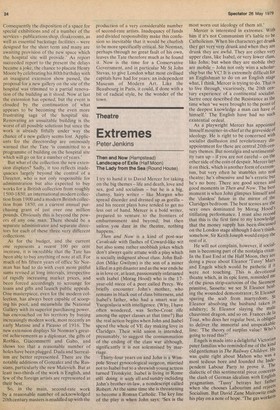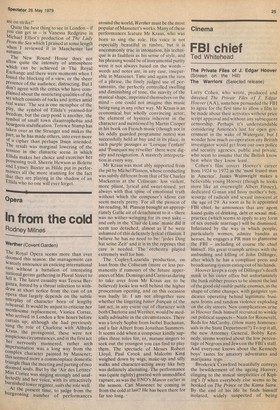Extremes
Peter Jenkins
Then and Now (Hampstead) Landscape of Exile (Half Moon) The Lady from the Sea (Round House) I try to hand it to David Mercer for taking on the big themes — life and death, love and sex, god and socialism — but he is a big, clumsy, hairy writer — like Morgan who spread disorder and dressed up as gorilla — and his recent plays have tended to get no Jess out of hand. Mercer is a bold writer, prepared to venture to the frontiers of embarrassment and beyond; but then unless you dare in the theatre, nothing happens.
Then and Now is a kind of post-war Cavalcade with flashes of Coward-like wit but also some rather snobbish jokes which don't always quite attune with a play which is socially indignant about class. John Baildon (Mike Gwilym) is the son of a miner killed in a pit disaster and as the war ends he is in love or, at least, passionately infatuated with Isabel (Morag Hood) who is the 17year-old niece of a peer called Percy. We briefly encounter John's mother, who remains in black out of class bitterness, and Isabel's father, who had a smart war in Yuogoslavia with intelligence. (Why, I have often wondered, was Serbo-Croat rife among the upper classes at that time?) But the real action begins when John and Isabel spend the whole of VE day making love in Claridges. Their wild union is intended, presumably, to suggest the consummation of the ending of the class war although, significantly it is not solemnised by marriage.
Thirty-four years on and John is a Wimpole Street gynocological surgeon, married not to Isabel but to a shrewish young actress turned Trotskyist. Isabel is living in Rome still doing it with all and sundry including John's brother-in-law, a nondescript called Robert. At the same time she is threatening to become a Roman Catholic. The key line of the play is when John says: 'Sex is the most worn out ideology of them all.'
Mercer is interested in extremes. With him if it's not Communism it's liable to be Catholicism. When his characters get drunk they get very very drunk and when they are drunk they are awful. They are either verY upper class, like Isabel, or very lower class, like John; but when they are mobile they are mobile — John not only wins a scholarship but the VC! It is extremely difficult for an Englishman to do on an English stage what, I think, Mercer is trying to do. That is to live through, vicariously, the 20th century experience of a continental socialist. Sartre once described the Resistance as the time when 'we were brought to the point of the deepest knowledge a man can have of himself.' The English have had no such existential ordeal. As a playwright Mercer has appointed himself mourner-in-chief at the graveside of ideology. He is right to be concerned with socialist disillusion and revolutionary disappointment for these are central 20th century themes. But nostalgia and sentimentality turn up — if you are not careful — on the other side of the coin of despair. Mercer lays it on thick, which is another form of extreMism, but very often he stumbles into real theatre; he's obsessive and he's erratic but he's no bore. There are good scenes and good moments in Then and Now. The best moment is when John glimpses himself and the 'classless' future in the mirror of the Claridges bedroom. The best scenes are the sexy ones dominated by Morag Hood's titillating performance. I must also record that this is the first time to my knowledge that the money supply has been discussed on the London stage although I don't think, somehow, Sir Keith Joseph would enjoy the rest of it.
He will not complain, however, if socialism is becoming part of the nostalgia craze. In the East End at the Half Moon, they are doing a piece about Eleanor 'Fussy' Mars and Engels which would be pathetic if it were not touching. This is devotional theatre which, in its epic form, reminded me of the pious strip-cartoons of the Siennese primitive, Sassetta: we see St Eleanor healing the wounded demonstrator; St Eleanor sparing the scab from martyrdom; St Eleanor absolving the husband taken in adultery; St Eleanor slaying the male chauvinist dragon, and so on. Frances de la Tour, who does her regular best, is obliged to deliver the immortal and unspeakable line: 'The theory of surplus value! Who's going to read this?' Engels is made into a delightful Victorian pater familias who reminded me of the kind old gentleman in The Railway Children. He was quite right about Mahon who was a most tedious bore and founded the Independent Labour Party to prove it. The dialectic of this sentimental piece concerns the clash of German idealism with English pragmatism. 'Fussy' betrays her father when she chooses Labourism and rejects Socialism. But David Zane Mairowitz ends his play on a note of hope. 'The gas workers are on strike!'
Quite the best thing to see in London — if YOU can get in — is Vanessa Redgrave in Michael Elliot's production of The Lady From the Sea which I praised at some length When I reviewed it in Manchester last autumn.
The New Round House does not allow quite the intensity of atmosphere Which can be achieved in The Royal Exchange and there were moments when I found the blocking of a view, or the sheer Presence of the audience, distracting. But I don't agree with the critics who have complained about the restricting qualities of the set which consists of rocks and jetties amid real water. The sea is one metaphor of the Play, the symbol of Ellida's yearned-for freedom, but the carp pond is another, the Symbol of small town claustrophobia and bourgeois stultification. Terence Stamp has taken over as the Stranger and makes the Part, as he has made others, into even more of a cipher than perhaps Ibsen intended. The result was marginal lowering of the tension in the climactic scene in which Ellida makes her choice and exorcises her Possessing troll. Sherrie Hewson as Bolette and Lynsey Baxter as Hilde put in performances all the more stunning for the fact that they are playing in the shadow of an Ellida who no one will ever forget.



































 Previous page
Previous page